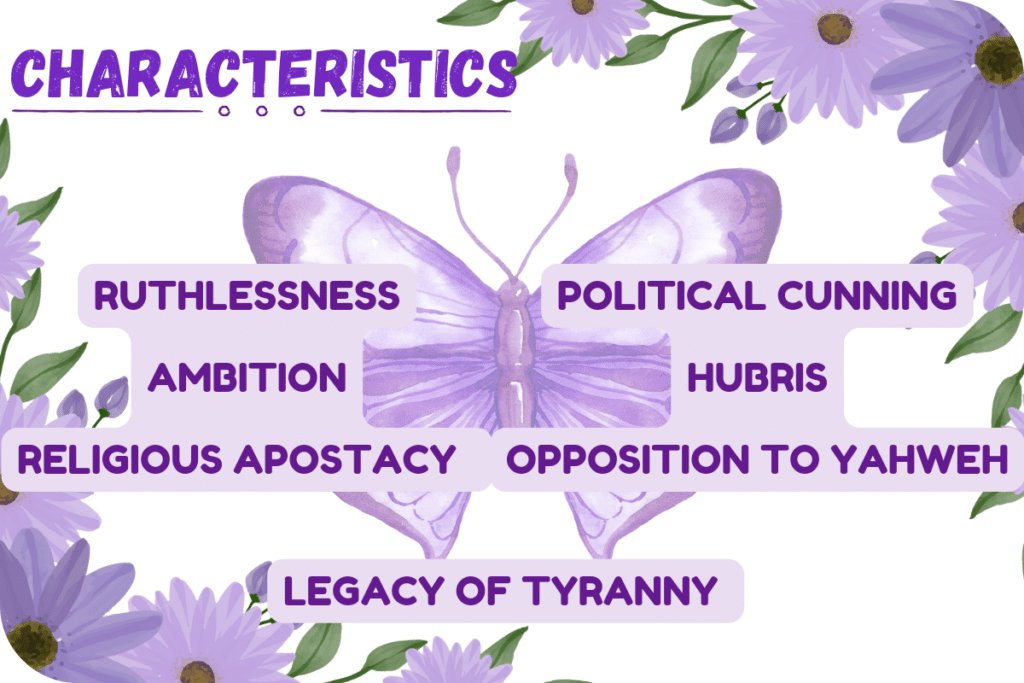AMBITIOUS ATHALIAH IN THE BIBLE
In the Bible, Athaliah is a name that carries significant historical and symbolic meaning. The name “Athaliah” is of Hebrew origin and is composed of two elements: “Ath” meaning “affliction” or “time of distress,” and “Yah” referring to the Hebrew name for God, often translated as “Yahweh” or “the Lord.” Therefore, the name Athaliah can be interpreted to mean “the time of Yahweh’s affliction” or “the Lord is my affliction.”

Athaliah in the Bible, a prominent figure in the Bible, was the daughter of Ahab and Jezebel, and wife of Jeham, king of Judah. After the death of her son, Ahaziah, she seized power, ruling for seven years and orchestrating the massacre of the royal house of Judah, except for Joash. Her reign was marked by promoting Baal worship and tyranny.
Eventually, a successful revolution led to her downfall. The story of Athaliah in the Bible is a compelling blend of political ambition, family betrayal, and religious turmoil, portraying her as a cautionary tale of the consequences of ruthless pursuit of power and defiance of divine will.
Historical Context
Athaliah’s narrative unfolds amidst the tumultuous era of the divided kingdoms of Israel and Judah in the 9th century BCE, characterized by political upheaval and strife between the northern and southern kingdoms. This period saw power struggles, religious tensions, and shifting alliances, setting the stage for Athaliah’s ruthless pursuit of control and her subsequent reign of terror.
Against the backdrop of this volatile political landscape, Athaliah’s actions, including the massacre of the royal house of Judah, reflect the intense power struggles and religious conflicts that defined this era of ancient Israelite history.
Background of Athaliah in the Bible
Athaliah in the Bible, born into a family of power and controversy, was the daughter of King Ahab of Israel and Queen Jezebel, known for promoting Baal worship and employing ruthless tactics. This lineage endowed Athaliah with significant influence, shaped by her mother’s strong personality and her father’s royal status.
Growing up amidst the political and religious turmoil orchestrated by her parents, Athaliah’s reign as queen of Judah mirrored the traits of her upbringing, leading to her ruthless pursuit of power, promotion of Baal worship, and eventual downfall at the hands of a successful revolution.
Marriage to Jehoram
Athaliah’s marriage to Jehoram, son of King Jehoshaphat, was a strategic alliance to strengthen ties between Israel and Judah. However, it also brought religious and political tensions from Athaliah’s homeland. As queen, Athaliah’s influence over Jehoram contributed to Judah’s shift towards Baal worship, departing from the traditional worship of Yahweh.

Her ruthless actions, including the massacre of the royal house of Judah, demonstrated the devastating consequences of this alliance. Athaliah’s story serves as a cautionary tale of the dangers of unholy alliances and the importance of discernment in political and spiritual matters.
Rise to Power
Athaliah’s path to power was marked by bloodshed and betrayal. After the deaths of her husband Jehoram and son Ahaziah, she seized the throne of Judah. In a ruthless move to secure her position, Athaliah in the Bible ordered the massacre of the royal family, eliminating potential rivals.
This brutal act highlights her determination and willingness to maintain power at any cost. As the only female ruler of Judah, Athaliah’s reign was characterized by the promotion of Baal worship and tyranny. Her story serves as a cautionary tale of the consequences of unchecked ambition and the dangers of allowing evil to flourish.
Reign as Queen
Athaliah’s rule over Judah for about six years was a unique occurrence of a female monarch in the ancient Near East. During her reign, she engaged in political maneuvering to consolidate her authority and promoted the worship of Baal, aligning with the religious practices instilled by her mother, Jezebel.

Athaliah’s reign was characterized by ruthless tactics, including the massacre of the royal family, as she sought to maintain power at any cost. Her story serves as a cautionary tale of the dangers of unchecked ambition and the consequences of deviating from traditional religious practices.
Religious Influence
Under Athaliah’s rule, Baal worship became more entrenched in Judah, as she supported the construction of temples and altars dedicated to Baal. This challenged the established religious order centered on the worship of Yahweh, leading to increased tension between the followers of Baal and those loyal to Yahweh.
The promotion of Baal worship by Athaliah in the Bible, who was influenced by her mother Jezebel’s practices, contributed to religious conflicts and societal division.
The Massacre of the Royal Family
Athaliah’s reign was marred by the infamous massacre of the royal family, a ruthless act aimed at securing her throne by eliminating potential threats, including the young heirs of her late son Ahaziah. However, unbeknownst to Athaliah, one infant, Joash, was rescued and hidden away by Jehosheba, the wife of the high priest Jehoiada.
This secret rescue allowed Joash to survive and eventually be crowned king, marking a pivotal moment of resistance against Athaliah’s tyrannical rule and the preservation of the Davidic lineage in Judah’s monarchy.
Joash’s Survival and Hidden Years
Joash’s survival was indeed miraculous, as Jehosheba and Jehoiada hid him in the temple of Yahweh for six years, safeguarding him from Athaliah’s tyranny. During this period, Jehoiada clandestinely orchestrated a rebellion against Athaliah, ensuring Joash was raised in the traditions of Yahweh worship and shielded from Athaliah’s vengeance.
This strategic concealment and careful preparation by Jehoiada not only preserved Joash’s life but also paved the way for his eventual coronation as king, marking a pivotal moment of resistance against Athaliah’s oppressive rule and the restoration of Yahweh-centered governance in Judah.
The Revolt Against Athaliah in the Bible
Jehoiada, the high priest, orchestrated a meticulous revolt against Athaliah in the Bible, rallying military and religious leaders of Judah. The revolt was strategically timed to coincide with a public gathering at the temple, ensuring broad support and minimizing potential retaliation from Athaliah’s loyalists.
Jehoiada’s plan involved dividing the guards into thirds to secure the palace, temple gates, and the king, while presenting Joash with the royal crown and God’s laws. The successful coup led to Athaliah’s execution, the destruction of the Baal temple, and the reinstatement of the Davidic dynasty, marking a significant moment in Judah’s history.
Downfall of Athaliah in the Bible
The climax of the revolt against Athaliah in the Bible culminated in Joash being revealed as the rightful heir to the throne, leading to Athaliah’s capture and execution. Her death signified the end of a tumultuous reign and the restoration of the Davidic line through Joash, highlighting the resilience of Judah’s religious and royal institutions.
This dramatic turn of events, orchestrated by Jehoiada and the people of Judah, symbolized the triumph of righteousness over tyranny and the preservation of the divine covenant, solidifying Joash’s reign as a pivotal moment in Judah’s history.
Legacy and Impact of Athaliah in the Bible
Athaliah’s reign had a profound impact on Judah, creating deep societal divisions through her promotion of Baal worship. However, her downfall and the reforms under Joash led to the restoration of Yahweh worship and the stabilization of the kingdom.
This narrative exemplifies the consequences of tyranny and the enduring resilience of faith and tradition in the face of oppressive rule. The story of Athaliah in the Bible stands as a powerful reminder of the importance of upholding religious values and the strength found in the restoration of righteous governance.
Comparison with Other Biblical Queens
The legacy of Athaliah in the Bible, akin to her mother Jezebel’s, is marked by influence, ruthlessness, and devotion to Baal worship. What distinguishes Athaliah is her direct rule as queen, unlike other queens who often exerted power discreetly. Athaliah openly wielded authority, facing the repercussions of her actions firsthand.
Her reign, characterized by tyranny and religious conflict, culminated in a dramatic downfall, contrasting with the more covert influence of other queens. Athaliah’s bold and overt exercise of power underscores her unique position as a female monarch in the ancient Near East, leaving a lasting imprint on Judah’s history.
Lessons from Athaliah in the Bible
The story of Athaliah in the Bible offers several profound lessons that can be applied to both historical and modern contexts. Here are some of the key lessons:
- The Dangers of Absolute Power: Athaliah’s ruthless pursuit and retention of power illustrate the corrupting influence of absolute authority. Her willingness to commit atrocities, such as the massacre of her own family, highlights how power can lead to moral decay and tyranny.
- The Consequences of Idolatry: Athaliah’s promotion of Baal worship in Judah serves as a stark warning against idolatry. Her efforts to replace the worship of Yahweh with that of a pagan deity brought about religious and moral decline, demonstrating the destructive impact of abandoning true faith.
- The Resilience of Faith: Despite Athaliah’s attempts to eradicate the line of David and impose her own rule, the survival and eventual rise of Joash underscore the resilience of faith and divine providence. This shows that even in the darkest times, faith can endure and prevail.
- The Importance of Righteous Leadership: Athaliah’s reign contrasts sharply with the more righteous leadership of others in Judah’s history. Her story highlights the importance of leaders who uphold justice, integrity, and religious faithfulness, as opposed to those who seek power for its own sake.
- Moral and Ethical Accountability: Athaliah’s eventual downfall and execution serve as a reminder that immoral actions and unethical leadership often lead to eventual retribution. Her story emphasizes that justice, though it may be delayed, ultimately prevails.
- The Role of Courageous Individuals: The actions of Jehosheba and Jehoiada, who hid Joash and orchestrated the revolt against Athaliah in the Bible, demonstrate the impact that courageous individuals can have in standing up against tyranny. Their bravery and faithfulness were crucial in restoring rightful leadership and worship in Judah.
- Family Influence and Legacy: Athaliah’s background as the daughter of Ahab and Jezebel illustrates how family influences can shape an individual’s values and actions. Her story shows the importance of positive familial influences and the long-lasting impact of family legacies.
- The Danger of Alliances Without Integrity: Athaliah’s marriage to Jehoram and the political alliances it represented ultimately brought negative consequences to Judah. This teaches the lesson that alliances and partnerships, whether political or personal, should be built on integrity and shared values rather than convenience or power alone.
These lessons from Athaliah’s life encourage reflection on the importance of moral integrity, the dangers of unchecked ambition, the power of faith, and the impact of courageous leadership.
Characteristics of Athaliah in the Bible

Athaliah in the Bible, as depicted in the Bible, is characterized by several distinct traits and actions:
- Ruthlessness: Athaliah’s reign is marked by her ruthless pursuit and retention of power. She goes to extreme lengths, including ordering the massacre of her own family members, to secure her position as queen of Judah.
- Ambition: Athaliah’s ambition knows no bounds. Despite being the daughter of a foreign king (Ahab of Israel), she seeks to establish herself as the sole ruler of Judah, disregarding any opposition or tradition that stands in her way.
- Religious Apostasy: Athaliah in the Bible is infamous for promoting the worship of Baal, a pagan deity, within Judah. Her efforts to introduce and enforce Baal worship lead to widespread religious conflict and moral decay within the kingdom.
- Political Cunning: Athaliah in the Bible demonstrates political acumen and cunning in maneuvering herself into power and maintaining her position despite opposition. She utilizes alliances, strategic marriages, and violence to achieve her goals.
- Hubris: Athaliah in the Bible exhibits a sense of arrogance and overconfidence in her reign. Despite warnings and signs of rebellion, she remains convinced of her invincibility until her eventual downfall.
- Opposition to Yahweh: Athaliah’s promotion of Baal worship directly challenges the traditional worship of Yahweh in Judah. This antagonism towards the God of Israel further exacerbates the religious tensions during her reign.
- Legacy of Tyranny: Athaliah’s rule leaves a dark legacy of tyranny and oppression in Judah. Her actions result in widespread suffering and turmoil, leaving a stain on the history of the kingdom.
These characteristics paint a complex portrait of Athaliah in the Bible as a formidable yet morally bankrupt figure whose reign serves as a cautionary tale against the dangers of unchecked ambition and religious apostasy.
Conclusion
Athaliah’s life and reign serve as a stark reminder of the complexities of power, faith, and legacy. Her story, though dark, offers valuable insights into the nature of leadership and the enduring struggle between good and evil. As the only female monarch in ancient Judah, Athaliah’s ruthless pursuit of power led to the massacre of the royal family and the promotion of Baal worship.
However, her downfall at the hands of a successful revolution organized by the high priest Jehoiada and the people of Judah underscores the resilience of faith and the importance of integrity in leadership. Athaliah’s legacy stands as a cautionary tale of the consequences of unchecked ambition and the triumph of righteousness over tyranny.
Reference
Unique FAQ’s
1. Who was Athaliah in the Bible? Athaliah was a queen of Judah, daughter of Ahab and Jezebel of Israel, known for her ruthless rule and promotion of Baal worship.
2.Why did Athaliah kill her family? Athaliah ordered the massacre of the royal family to secure her position as queen and eliminate any potential rivals to the throne.
3.How did Joash survive Athaliah’s massacre? Joash was saved by his aunt Jehosheba and hidden in the temple for six years, protected by the high priest Jehoiada.
4.What was the significance of Athaliah’s reign? Athaliah’s reign marked a period of religious conflict and political instability in Judah, with her promotion of Baal worship challenging traditional Yahweh worship.
5.What lessons can we learn from Athaliah’s story? Athaliah’s story teaches the dangers of unchecked ambition and idolatry, and underscores the importance of righteous leadership and faith in overcoming tyranny.


1 thought on “36. AMBITIOUS ATHALIAH IN THE BIBLE”